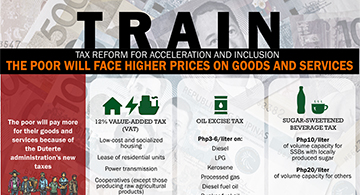
Happy New Year! The New Year seems to usher in difficulties for our kababayans back home. One hot topic in the Philippines at this time which concerns those difficulties, is TRAIN. No, it has nothing to do with locomotives. TRAIN or Tax Reform for Acceleration and Inclusion, which was once seen as a means to alleviate poverty, is now being criticized as anti-poor and the Philippines’ lower and middle class are bracing themselves for the effects of this tax reform. Kababayans here in Canada should have their ears to the ground, as we will also be feeling its effects.
What is TRAIN or the Tax Reform for Acceleration and Inclusion? The Tax Reform for Acceleration and Inclusion (TRAIN) was signed into law by President Rodrigo Duterte on Dec. 19, 2017 and impacts the take-home pay of Filipinos, prices of goods and services, and spending and consumption.
How does it affect Filipinos?
While TRAIN was promoted as a deduction of income tax and increase in “take home pay”, it also includes higher taxes on basic commodities. This means that for high-income earners such as those in upper management, presidents and CEOs of big corporations, their take home pay will significantly increase. On the other hand, many Filipinos like the owner of a karinderia who do not have a monthly salary, will be dependent on the informal economy through retail or the services of tricycle and jeepney drivers or, employees in small stores and sidewalk restaurants. Many of their customers are also from the informal economy. It simply means that they will not benefit from the higher “take home pay” because of lower income tax and the lack of a monthly salary. Meanwhile, their expenses will significantly increase.
Think about this.If the corporate CEO of a big company bought a luxury car, say a BMW that costs Php3.25 million, they will be saving approximately Php337,000. However, if the owner of a small karindera needs to go to the market to buy supplies, they have to pay an added jeepney fare of Php4 to Php8, return trip. The cost of their supplies, such as cigarettes, will also see an increase of up to Php2.50 per pack while soft drinks will increase up to Php12 per litre. Due to these increases, the owner will need higher capital funds.
Inadvertently, the karinderia owner and her fellow poor customers will be paying for the savings of the CEO’s luxury car.
A jeepney driver will pay an additional Php2.50 per litre of diesel while a tricycle driver will pay an additional Php2.65 per litre of gasoline. The owner of the karinderia will be paying an additional Php11 per 11kg tank of LPG.
What about the farmers and the fisher folks in the rural areas? In recent statistics, these individuals are in the 34% poverty incidence compared to other sectors. They are dependent on kerosene that they use for light, cooking and work. Kerosene will increase to Php3 per litre, the highest among the petroleum products.
There are over 15 million workers in the Philippines that do not have a regular monthly wage, like someone who works in a small sari-sari store, a labandera or tricycle driver. We have not even taken into account the approximately 2.4 million unemployed workers.
But even the ordinary workers or employees will not benefit from TRAIN in the long term. There will be no pay increase but they will also carry the burden of higher prices and expenses. These high prices will also deduct from the so called “high take home pay” of workers.
What does that have to do with me?
Many of us are here in Canada today for work. Whether we are a citizen, immigrant or temporary foreign worker, we continue to support our families back home. Thirty percent of the over 103 million Filipinos in the Philippines are dependent on migrant remittances. Many or our kababayans here still send most of their salaries to their families back home. In the records of Banko Sentral ng Pilipinas in 2015, over US$1.5 billion was sent by Filipinos in Canada.
TRAIN will put a lot of pressure on migrant workers and families here in Canada. Many will be pushed to find a second job or take longer working hours in order to subsidize the expenses of their families back home.
Migrant workers that are under the Temporary Foreign Worker Program (TFWP) will be the most affected among the Filipinos in Canada. Many, if not all of them, are separated from their immediate families. They will be forced to find other means that will allow them to send money to their families even if it means violating the conditions of the TFWP.
Filipinos in Canada must also look into matters that affect the Philippines as it directly affects us.


